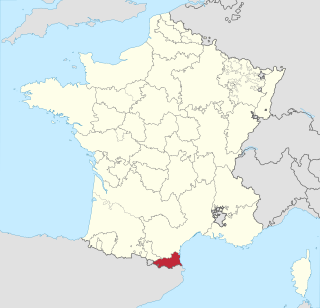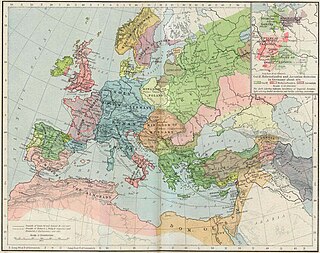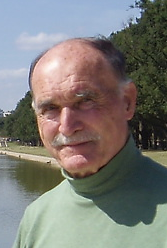Related Research Articles
Year 1130 (MCXXX) was a common year starting on Wednesday of the Julian calendar.

Year 1324 (MCCCXXIV) was a leap year starting on Sunday of the Julian calendar.
Year 1213 (MCCXIII) was a common year starting on Tuesday of the Julian calendar.

Carcassonne is a French fortified city in the department of Aude, region of Occitania. It is the prefecture of the department.

Languedoc-Roussillon is a former administrative region of France. On 1 January 2016, it joined with the region of Midi-Pyrénées to become Occitania. It comprised five departments, and bordered the other French regions of Provence-Alpes-Côte d'Azur, Rhône-Alpes, Auvergne, Midi-Pyrénées towards the north, and Spain, Andorra and the Mediterranean Sea towards the south. It was the southernmost region of mainland France.

Roussillon is a historical province of France that largely corresponded to the County of Roussillon and part of the County of Cerdagne of the former Principality of Catalonia. It is part of the region of Northern Catalonia or French Catalonia, corresponding roughly to the present-day southern French département of Pyrénées-Orientales in the former region of Languedoc-Roussillon.

Henri Pirenne was a Belgian historian. A medievalist of Walloon descent, he wrote a multivolume history of Belgium in French and became a prominent public intellectual. Pirenne made a lasting contribution to the study of cities that was a controversial interpretation of the end of Roman civilization and the rebirth of medieval urban culture. He also became prominent in the nonviolent resistance to the Germans who occupied Belgium in World War I.

The High Middle Ages, or high medieval period, was the period of European history that lasted from AD 1000 to 1300. The High Middle Ages were preceded by the Early Middle Ages and were followed by the Late Middle Ages, which ended around AD 1500.

Teofilo F. Ruiz is a Cuban-American medieval historian and professor currently at University of California, Los Angeles (UCLA). In 2012, he was awarded the National Humanities Medal by former President Barack Obama. He is consistently rated as one of the most popular professors at UCLA, and has published many books as well as dozens of articles in scholarly journals as well as reviews and smaller articles.
Kenneth W. Harl is an American scholar, author, and classicist. He received his B.A. in Classics and History at Trinity College, and his M.A. and PhD at Yale University. He was a Professor of History at Tulane University in New Orleans until his retirement in 2022.

The Aragonese Crusade (1284–1285), also known as the Crusade of Aragon, was a military venture waged by the Kingdom of France against the Crown of Aragon. Fought as an extension of the War of the Sicilian Vespers (1282–1302), the crusade was called by Pope Martin IV in retribution for Peter III of Aragon's intervention in Sicily, which had damaged the political ambitions of the papacy and France.
Ronald B. Herzman and William R. Cook are both Distinguished Teaching Professors at the State University of New York at Geneseo, and are collaborators on numerous intellectual projects about Medieval and Renaissance literature, history, and culture. Herzman is a professor of English, and Cook is a professor of History. Herzman earned his PhD from the University of Delaware and joined the Geneseo faculty in 1969. Cook earned his PhD from Cornell University and joined the Geneseo faculty in 1970; he has specialized in the history and art history of the early Franciscans.
Dame Janet Laughland Nelson, also known as Jinty Nelson, is a British historian. She is Emerita Professor of Medieval History at King's College London.

The University of Perpignan is a French university, located in Perpignan.
Mark Gregory Pegg is an Australian professor of medieval history, currently teaching in the United States at Washington University in St. Louis, Missouri. His scholarship focuses upon heresy, the inquisition, the Albigensian Crusade, and the history of holiness. Apart from these specific scholarly pursuits, he writes more broadly about what shapes and defines the medieval West from 200 to 1500. He is the author of The Corruption of Angels: The Great Inquisition of 1245–1246, A Most Holy War: The Albigensian Crusade and the Battle for Christendom, and Beatrice's Last Smile: A New History of the Middle Ages.
Jocelin of Soissons was a French theologian, a philosophical opponent of Peter Abelard. He became bishop of Soissons, and is known also as a composer, with two pieces in the Codex Calixtinus. He was teaching at the Paris cathedral school in the early 1110s.

James Penn Whittenburg is a professor of history at the College of William & Mary in Virginia.

Brian Tierney was an English historian and medievalist. He was a member of the faculty of the Catholic University of America for eight years until becoming a professor of medieval history at Cornell University in 1959, where he was later appointed as the Goldwin Smith Professor of Medieval History in 1969 and the first Bowmar Professor of Humanistic Studies in 1977.

Mohammed and Charlemagne is an academic book by the Belgian historian Henri Pirenne (1862–1935) which was first published posthumously in 1937. It set out an alternative argument about the end of Roman influence in Europe and the emergence of the Dark Ages which emphasised the importance of the Arab expansion in the Middle East and Levant which has become known as the Pirenne Thesis. Although successive historians have tended to reject the argument as an explanation of the period, it remains influential as a means of thinking about geography and periodisation in the Early Middle Ages and the debate it sparked is widely taught in university medieval history courses.
References
- ↑ "10 professors featured in Princeton Review's 'Best 300 Professors Archived 2013-12-20 at the Wayback Machine ," The College of William and Mary, April 3, 2012
- ↑ "La corónica ~ Book Award 2018".